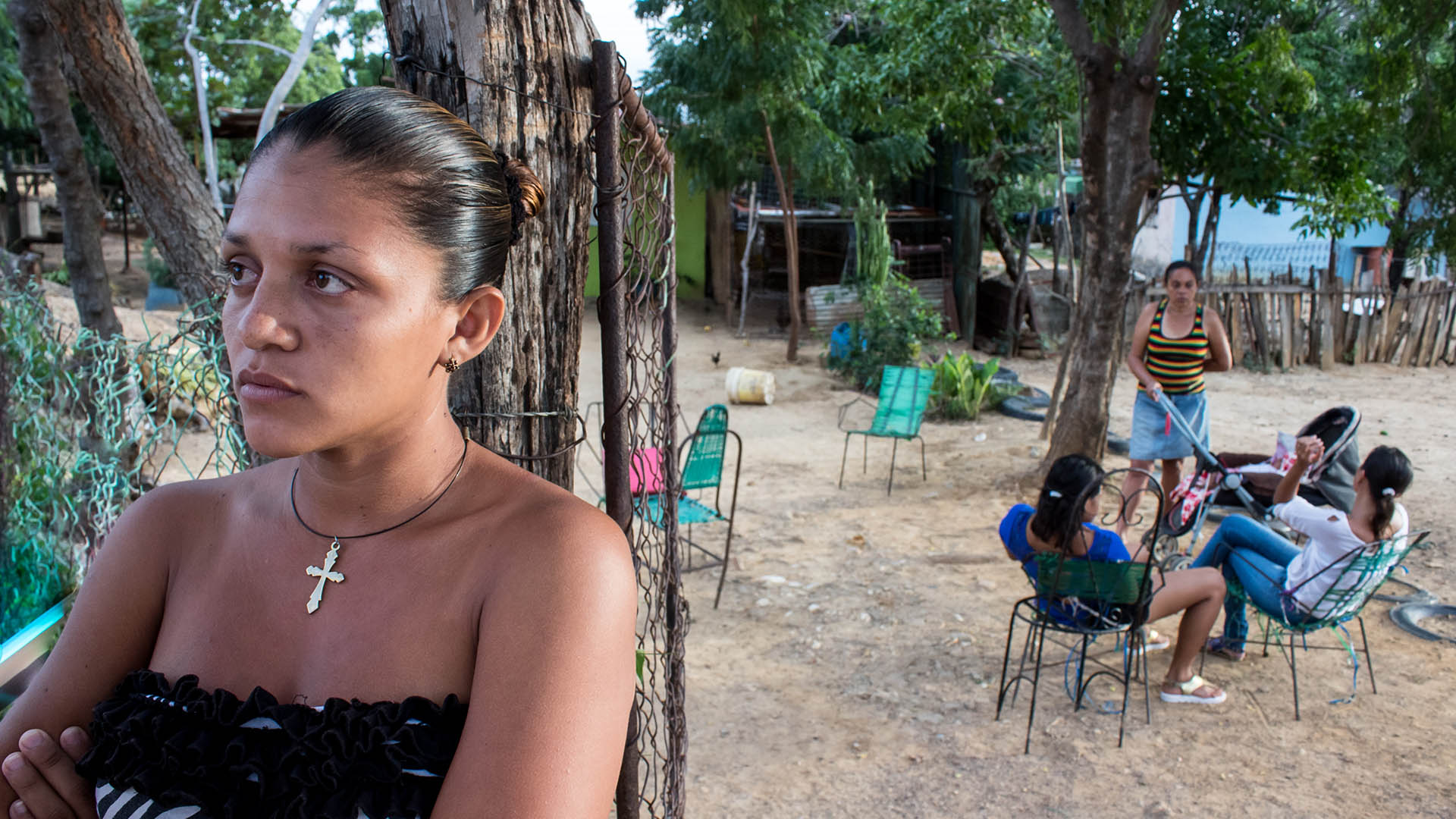

Thirty people were traveling from Falcon, a Venezuela’s Mid-Western, to the Dutch island of Curacao, in a speedboat with capacity for 15, which capsized in an area of turbulent waters. Among them were the husbands of Nereida and Normery, two sisters from a family in La Vela who know very well the meaning of illegally cross the ocean. A third sister, who carries a Christ on her breast, also escaped by boat and she is the only one whose husband is working in Curacao.
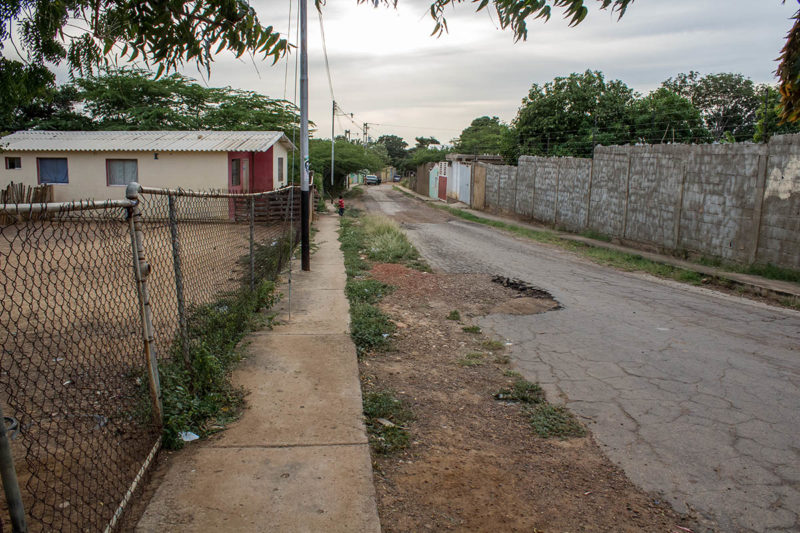 Photographer: Francisco Colina
Photographer: Francisco Colina
Nereida Raaz does not imagine life without Oliver yet. She clings to the hope that he came out alive from the wreck of the boat in which he was traveling to Curacao, along with 29 other people, the early hours of Wednesday, January 10. This is how she welcomed 2018 and, since then, she decided to stay at home, locked up with her daughters.
She has been told many things about what happened: he was being helped out of the sea and a wave took him away, he was arrested and imprisoned, he was in a hospital, wounded. But the only certain thing for her is that Oliver has been missing for more than a week. And on December 12, they celebrated their 16th wedding anniversary.
-I want people to tell me the truth next time, do not say that they saw him here or there, if he is alive or dead, tell me. Not knowing anything is an uncertainty. If he is alive, I wonder how wounded he is, because by the condition of the boat after the wreck, he must be wounded. Or if he is in prison, tell me. What I want is to have some news.
The day Oliver left he said: “I’m going to the coast.” Nereida did not have any specific or terrible thought crossing her mind, but she felt sad when she heard that brief farewell. She knows, like everyone in Falcon, in the center of Venezuela, that crossing the ocean sea to Curacao is fraught with danger.
It is a journey of almost seven hours, in speedboats that are often devoid of minimum safety standards. Without floating devices, to open sea, at night and with only the stars as light and roof. It is the risk taken by those who seek and illegal entry into the Dutch island territory looking for a job paid in dollars.
The news came to Nereida’s ears like all the bad news, out of the blue and when it was known by others. It was 10:00 in the morning of Wednesday. His father called his sister. He had learned early, but wanted to confirm the bad news and then felt encouraged to share it.
It was not just one bad news. There were two.
Tico, the husband of her sister Normery, had died in the accident. And Oliver probably too. It was the first thing Nereida heard. That Oliver had drowned, but his body had not been found. She thought, however, that he was alive.
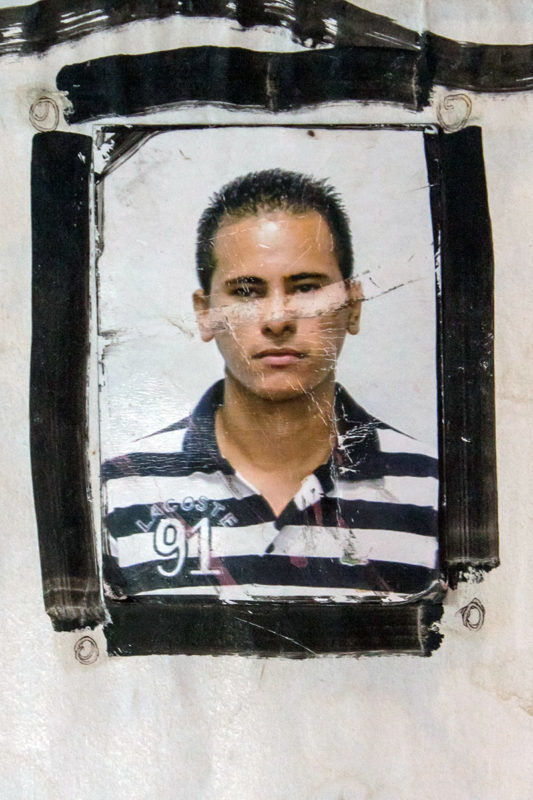
Oliver Cuahuromatt Velásquez, 32, left home before Christmas with the intention of traveling to Curacao. Nereida does not know why, but they did not set sail till January 9th. Or maybe she knows why, but she does not want to tell the reason. Her husband advised her “better not to know”. That’s why she says she does not know where the boat set sail from and who was guiding it.
Her brother-in-law, Danny José Sánchez Piña, 33, nicknamed Tico, and his cousin Joselyn Piña, 24, were also among the passengers. Nereida’s father and two brothers, as well as other friends who have been working on the island for months were waiting for them in Curacao. It is assumed that they were the ones who helped them to pay the 10 million bolivars charged by the coyotes. Oliver felt encouraged to borrow money, confident that he could pay when he started working there.
These trips are clandestine, contacted through third parties, very secretly. They are organized in La Vela de Coro, the so-called Puerto Real of Falcon state. The trip joined by Oliver and Tico, from the beach of San José de la Costa, had been aborted twice. This is what the survivors of the wreck have told their relatives. First, the boat broke down, then by personal issues of one of the two men who would guide it.
The illusion of the trip and the benefits that they would obtain made Oliver and the other 29 passengers forget about the Holidays. They spent Christmas Eve and New Year’s Eve “in the bush”, as they call the place from where they awaited for the guides to tell them that they would set sail.
Oliver left before the 24th. Nereida does not remember the day. He returned on the 26th and stayed at home until December 31st in the morning. On Friday, January 5, he came back again to visit his sick girl. And on Saturday 6th, at 5:00 in the morning, he left for the last time. She did not know where he was, but he always called and said he was fine.
It was the second time Oliver traveled to Curacao. In 2017 he tried it and was deported the following week. He was caught on the same day he arrived, while going out of the bushes. That time as well he traveled with Tico.
In Falcon, Oliver worked on whatever he could find. He did not get his high school diploma because of the need of earning money to take home. He was a paramedic at the Simon Bolivar outpatients’ clinic in La Vela. Later he got a job in Mision Vivienda Venezuela, and that allowed him to get the house where Nereida now keeps waiting for him, in Calle Proyecto, Barrio Nuevo area, in La Vela de Coro. Her father was the master builder of her house, as well as the other three houses of the family. Her sister Normery, their cousin and one of their uncles live in next door houses.
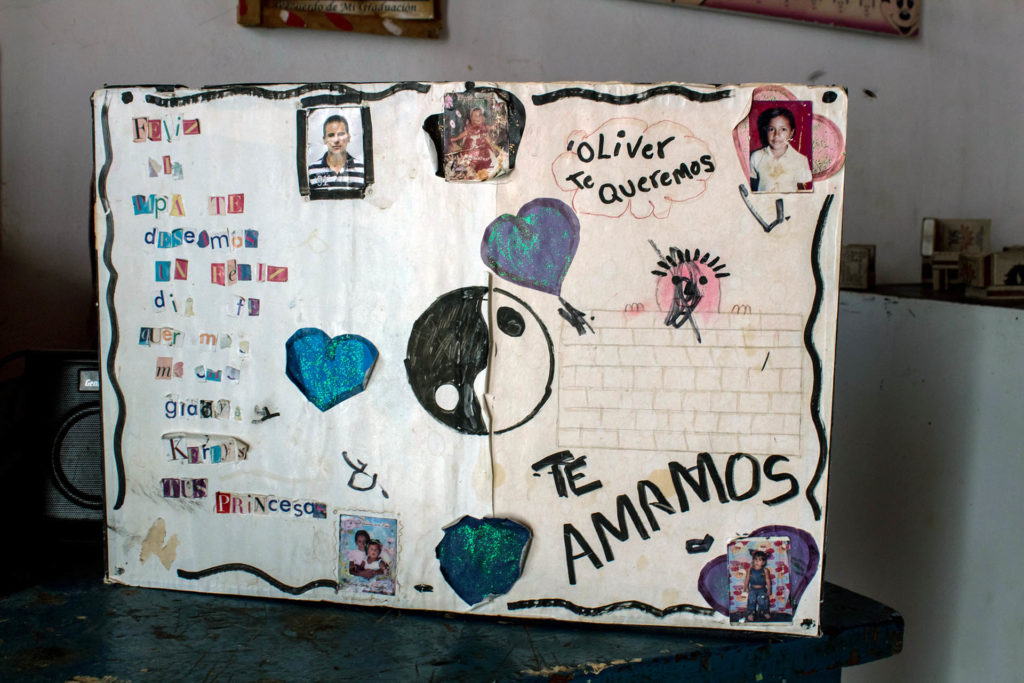
Oliver married Nereida when Gladys, their oldest daughter, was 2 years old. They had met in Plaza La Antillana, in La Vela, one day when he was on duty as a paramedic. They had a relationship for three years, until she got pregnant. Gladys is in 7th grade and Kerlys, the youngest, is 4 years old a preschooler.
They had fights, like every couple, sometimes over nonsense. He rarely left their house alone. Whenever possible, they would take the girls to the Paseo de la Vela or to eat hot dogs. He was unemployed for six months and spent his time taking his daughters to school or taking care of his mother who suffers from diabetes. Nereida thinks this was one of the main reasons why he decided to migrate: in order to pay for her treatment. The father is a coffee seller. Oliver has three siblings. He is the third child.
Nereida works as a kitchen assistant in a restaurant in Colombia Sur area, near Barrio Nuevo. The cooks are her sister Normery and a cousin. Their work begins very early to have the menu they offer ready for lunch: stewed or grilled chicken, steak, chop, beef tripe, beans. And now, the two sisters are also united by the tragedy of the shipwreck.
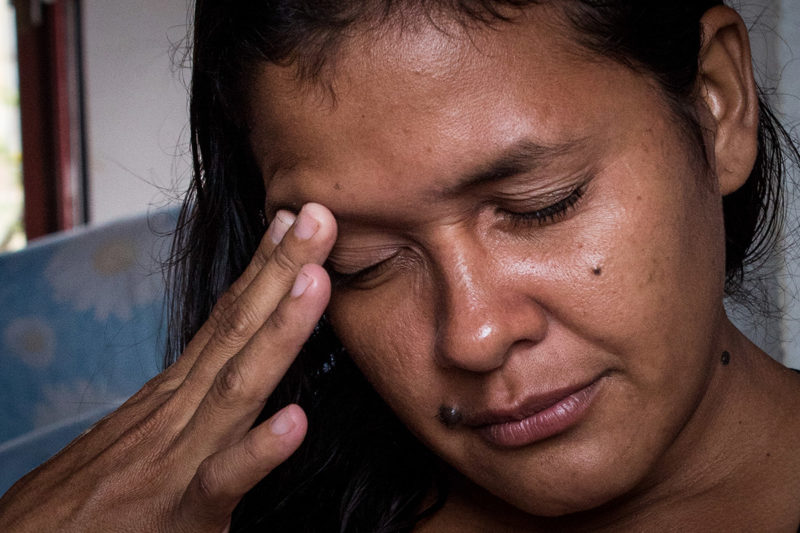
Someone told Nereida that search of missing people will not stop. If Oliver was hiding, as some have suggested, he would have looked for a phone, whether it was borrowed, to call her or his mother. She has been told that some of the survivors are imprisoned in Curacao and others in the hospital, but nobody has said who they are.
Normery, on the other hand, is certain that she lost her husband, but she has not been able to bury him because the investigations of the accident have not concluded and the body must be repatriated as part of a joint effort between the governments of Curacao and Venezuela, whose relations are not at their best due to the border closure ordered by Nicolas Maduro.
-I’m like he’s out there, I have not even cried. It’s like I do not accept it, I need to see his body. For me it’s as if he is traveling, out there.
She and Tico met 13 years ago at a party, and two months later, they decided to live together. She already had a 2-year-old girl that he raised as his own. Then they had another, who died at age 2, on Wednesday, January 10, the same day that Tico died. Then another girl was born, who is now 6 years old. Normery is 35.
Tico worked as a taxi driver. It was the third time he tried to settle in Curacao, after two deportations.
“Honey, you tell me, I already talked to my mom and she asked me not to leave,” he told Normery, trying to convince himself that he should stay in Venezuela.
“If you do not want to leave, do not leave,” she answered.
Tico told her he would not leave. But then he left.
On Tuesday morning he called her from the bushes. And he said:
-Take care of my daughters, I love them very much. Tell them I’ll be fine where I’m going and not be sad.
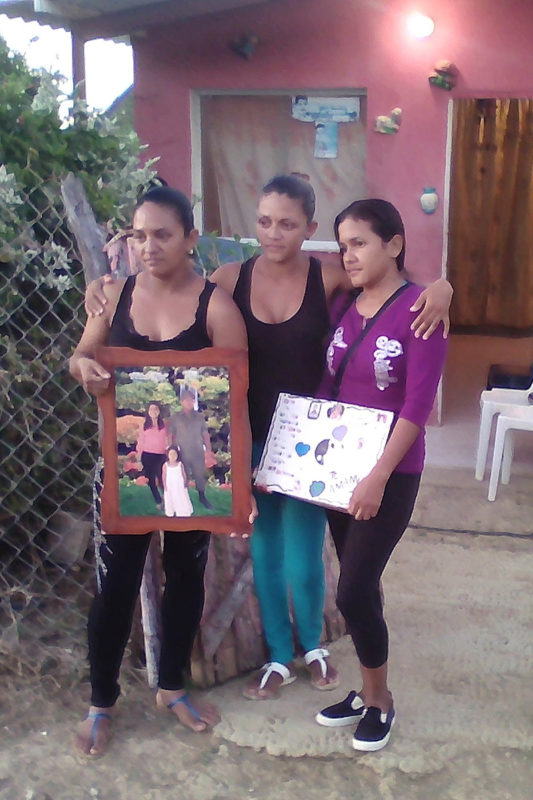
Neeira arrived at her mother’s house on Wednesday morning and became uneasy when she saw so many people. He saw Normery shattered and Nereida very anguished. Aged 26, she is another Raaz girl, a family of 10 siblings: 5 women and 5 men. The father and two of the sons are working in Curacao. Also the husband of Neeira, who has been living on the island for two years. She did the tour herself in June 2017, but had to return.
-I went away for two months because we have a girl who suffers from convulsions and we could not get the medication, but I did not get it either. The police caught me when I went to the store and I was asked for papers. I was not scared because it’s normal, I know I’m not from there. However, they treated me well, I was in a cell and they gave me food.
Then she paid 700 thousand bolivars to be taken by raft. And she made the same journey that her husband and two brothers-in-law had to make.
-We always one leave one week before to the bushes, because suddenly one day they say: “Today we are setting sail”. We carry food for those days. From here we leave around 5:00 in the evening and travels all night. On the trip you feel anything. We talk, we pray, some sing to face fear. They tell us that if we have floating devices, we should take them, but most of people do not wear them because they know how to swim. I do not know how to swim, but that was not a problem because you arrive and are helped out on the shore.
What happened now was an accident, a mistake. What I did was to walk to a certain point, I asked for help and I received it. Nobody was waiting for me. I worked as a maid for a family and they treated me very well, they are very good people. What I earned was sent to my kids and they bought the medication for my daughter.
Until she was deported.
And she did not want to go back.
Having left her children with her mother was a greater concern than her desire to stay with her husband.
-For them I will not return. While I’m with my family, it does not matter. When I arrived, I found out I was pregnant. Now that baby is 3 months old. We live in a rented room in La Comunidad area, but I want a house of my own. I have to work hard for that, because I’m not going to wait for anybody to give it to me.

The mayor office of Colina municipality, whose capital is La Vela de Coro, decreed three days of active mourning for the tragedy and promised to help the relatives of the deceased with the funeral. The governor, Victor Clark, extended the mourning period to all Falcon State and promised to supervise the investigation of the facts.
In the shipwreck, an unknown number of people lost their lives. According of some survivors it was learned that the speedboat in which they traveled was split in two, by a huge wave that turned it away from the beach. The boat’s capacity was 15 people, but 30 people, between 18 and 33 years old were traveling. The wreck is believed to be caused by an error of the guide of the boat, who sailed through an area of turbulent waters. Those who could not swim died when the ship capsized.
The authorities of Curacao have rescued five bodies in the Koraal Tabak sector of the island. Only four of them have been identified: Yajaira Josefina Marquez, Jeanaury Guadalupe Jiménez Chirino, Jaires Leomar Loaiza Soret and Danny José Sánchez Piña, Normery’s husband.
Civil Protection informed that some of the survivors have contacted their relatives, but they do not know how many they are, where they are and what their names are.
Regnal Lugin, director of the Curacao police force, reported that in 2016 60 illegal vessels from Venezuela were caught on the island, while in 2017, the number reached 300. And that at least 12 thousand Venezuelans, like Neeira’s husband, are in an irregular situation.
One of the five detainees in Curacao may be Oliver, Nereida’s husband. She would like to believe that’s the case. But uncertainty is eating away her days and her sisters’.
Translation: Claudia Arteaga-Hung
1940 readings
I love journalism with a purpose. I am convinced that if journalism does not make a contribution, it’s not worth exercising. I am a tireless learner who is passionate about journalism for children, the defense of the environment, human rights and heritage. That’s the kind of stories I don’t get tired of telling.